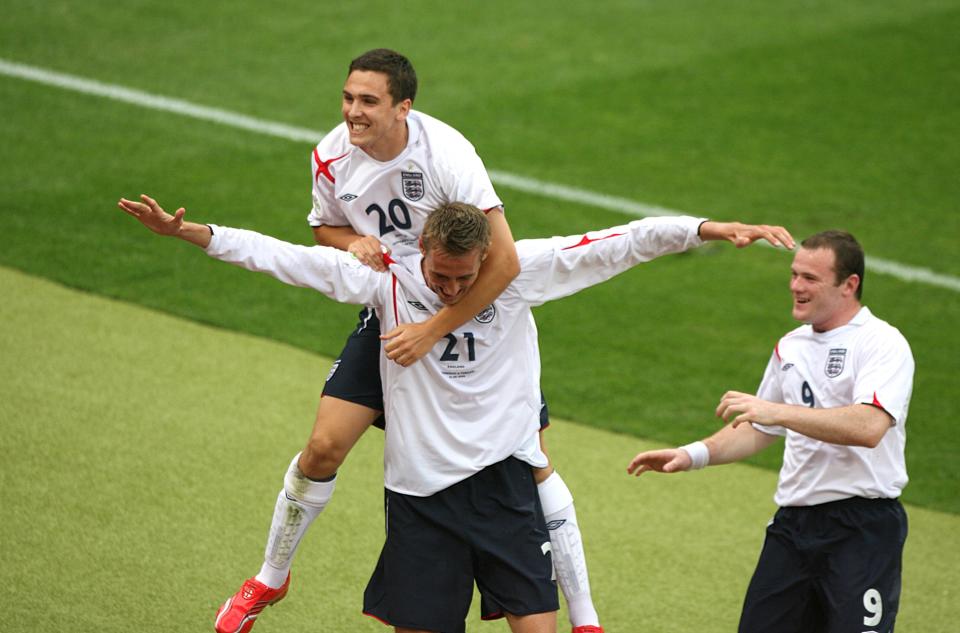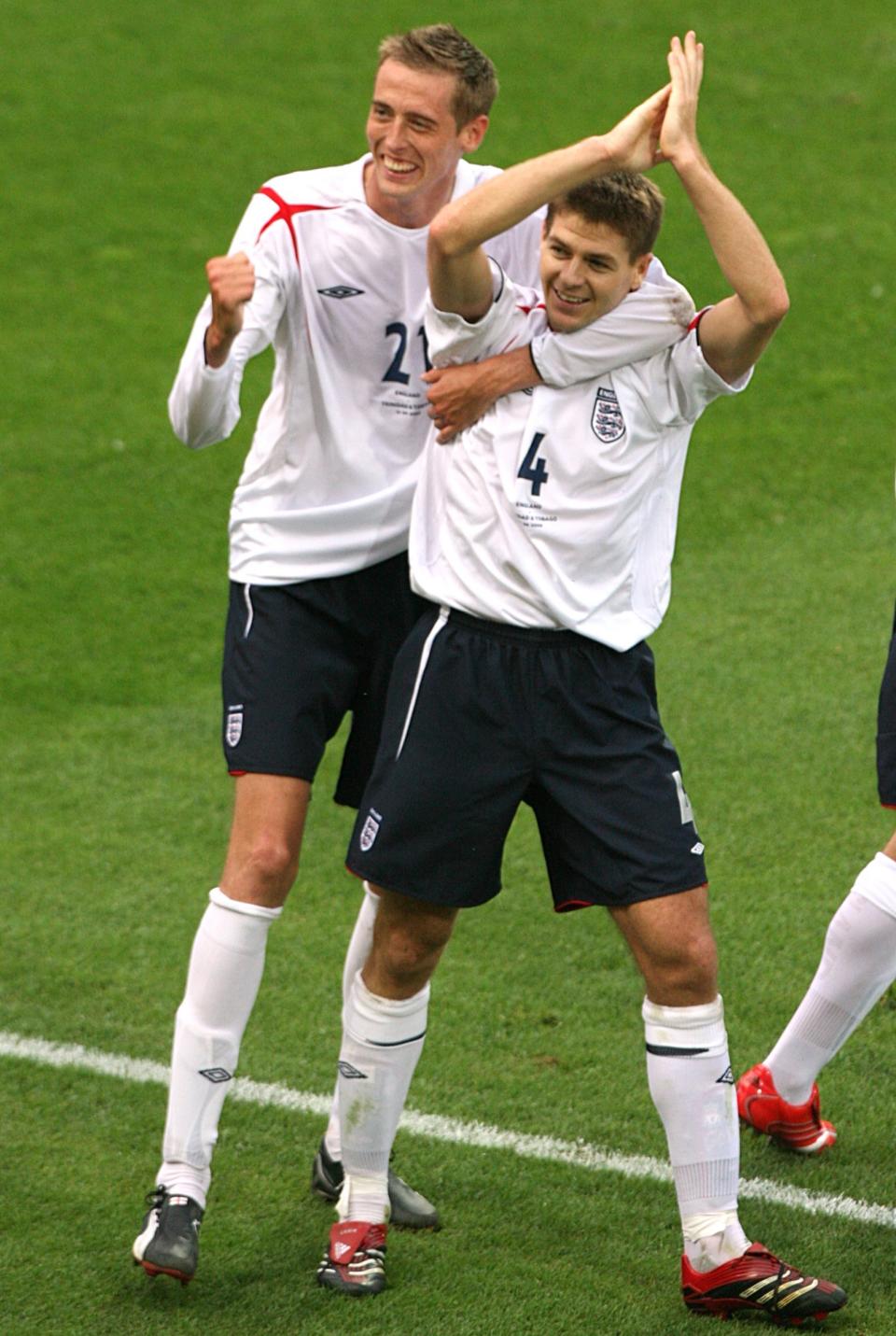How Peter Crouch became ‘the most hated Englishman in the history of Trinidad and Tobago’

Unlike some of his teammates at the World Cup in 2006 – John Terry, mainly – it is objectively hard to dislike Peter Crouch. With the natural build of the Slenderman and the demeanour of an especially large and awkward teenage boy, Crouch is the gangly everyman of English football and a striker who continues to surprise with his ability to control a ball with his feet.
Despite having the look of the scrawny kid who was forever being picked last in the playground, he has outlasted the majority of the players who accompanied him to Germany for Sven-Göran Eriksson’s last tournament as England manager.
Not much younger than former ‘little and large’ strike partner Michael Owen – who retired five years ago – Crouch is still trundling about and scoring at roughly the same rate as he did at his professional peak.

His goals-to-game ratio has generally been mediocre, of course, but Crouch has other ways of making himself useful. Behind the veil of comedy value, he has hidden guile, wiliness and something equating to decent technique.
He may have been written off as a gormless lanky lad, a spindle-limbed target to pump the ball to at corners, but Crouch’s career highlights are more extensive than merely doing ‘The Robot’ and (allegedly) extorting nachos from cinema workers. Take his most iconic goal, for instance, a header which made him a public enemy on a dual-island nation in the southern Caribbean.
40 years of hurt
The 2006 World Cup was a tournament of great significance for England. Not only was it held in Germany, the home of the Three Lions’ greatest nemeses, it marked a full 40 years since England’s one and only triumph in the competition.
Having reached the quarter-finals of consecutive major tournaments in the form of World Cup 2002 and Euro 2004, England fans and the national press were still capable of earnestly hyping the team’s chances.
Eriksson’s time as manager was coming to an end – this after he had been caught in a sting by ‘Fake Sheikh’ Mazher Mahmood in which he admitted he could leave the England job for Aston Villa on account of a fictitious big-money takeover – but he could still call upon the likes of Rio Ferdinand, Steven Gerrard, Frank Lampard, David Beckham and Wayne Rooney. Plus, well, Crouch.
WORLD CUP 2018 – LATEST NEWS AND ANALYSIS FROM YAHOO SPORT
Russia 2018: How to watch EVERY World Cup match – and keep your job
Football Cliches: Five cult heroes from World Cup history, and how their legacies live on
From Buffon to Bale: The big-name players who WON’T be at the World Cup 2018
Ranked! The 10 most iconic World Cup haircuts of all time
How previous World Cups would have been different with VAR
The tournament didn’t get off to the best of starts, England labouring to a 1-0 win against Paraguay in their opening game. Only an own goal from Carlos Gamarra separated the two sides at the final whistle, with England widely criticised for an unconvincing display.
Rooney was unavailable for the first two group matches owing to a foot injury, so Eriksson opted for a lopsided front two of Crouch and Owen. The initial signs were less than promising, but he nonetheless persisted with the asymmetrical strike partnership for the following game.
Meeting with minnows
Next up, England faced the ultimate underdogs in Trinidad & Tobago. The Caribbean nation with a population of just over 1,000,000 – the majority of whom were more interested in cricket than football – had qualified for the World Cup after edging through an inter-confederation play-off against Bahrain.
In footballese, the term ‘minnows’ may as well have been coined for the Trinidad & Tobago national team as they headed to Germany.


Surprisingly, and in a sign of things to come, they had clung on for a 0-0 draw with ten men against a Sweden side spearheaded by Henrik Larsson and Zlatan Ibrahimovic in their first game.
That same defensive doggedness was in evidence for the first 82 minutes of their meeting with England. The Three Lions huffed and puffed against their Caribbean opponents, labouring against a side several dozen places below them in the world rankings.
Crouch was a source of intense frustration for England fans, giving one of the ‘Bambi on ice’ performances which were a trademark of his underwhelming spell at Liverpool. Where Crouch was usually more prolific on the international stage than he was at club level – he still has an impressive record of just over one goal every two games for his country – against Trinidad & Tobago he miscued over and over again.
There was an attempted scissor kick at the end of the first half which Crouch spooned wide from a great position. In the second half, he was picked out by a pinpoint cross from David Beckham only to head over from five yards.
There were a litany of near-misses and lackadaisical attempts at goal. Then, on the 82rd minute, with many England fans screaming for him to substituted, Crouch did something which would go down in World Cup folklore.
‘Definitely a foul’
With seven minutes of normal time remaining and England on course for an embarrassing result which could put their progression from the group stage in jeopardy, Crouch finally opened the scoring. It was a trademark goal from the 6’7 striker, who climbed highest at the far post and craned his neck like a half-starved giraffe to nod home.
The only thing was, at a second look, there was a problem in the immediate build-up. In the act of scoring, Crouch had hauled himself up into the air using an opponent’s dreadlocks.

The opponent in question was Brent Sancho, a central defender who was a regular fixture for Gillingham in League One. Despite his protestations, the ref could see nothing wrong, the goal stood and England went on to wrap up the game with a long-range follow-up from Steven Gerrard.
In fairness to referee Toru Kamikawa, Crouch’s spider-like limbs may have spun a web of confusion over the incident. Had he looked a little more carefully, however, he would have seen Crouch literally grab a handful of Sancho’s hair and use him as a human climbing frame.
READ MORE: De Gea – Spain in great shape for World Cup
Sancho was understandably furious after the final whistle. “The first goal was definitely a foul by Crouch,” he said. “He was all over my back. Crouch was all over me. He was definitely pulling me back and that meant I couldn’t get to him. But don’t forget, we are tiny Trinidad and Tobago and there is no way that the referee was going to blow that whistle and disallow the goal.”
Given that the British mentality is heavily skewed in favour of the underdog, even England fans watching back home had to admit Crouch’s goal was an epic act of sh*thousery. One of the smallest teams at the World Cup had been denied a dream result on account of his opportunism, leaving the national press suitably sheepish about the result.
READ MORE: 5 of the most lethal groups of death
Where English papers ranged from semi-apologetic to deliberately understated in their treatment of the incident, the global coverage was less forgiving.
“Crouch was already coming in for plenty of stick from abroad, being called things like the ‘two-meter asparagus’ as newspapers heaped opprobrium on the England team, but he has begun to hear it from home too,” was the verdict in The New York Times from an article titled ‘The Hair of God’ in reference to Diego Maradona’s world-famous act of deception.
If Crouch’s crafty foul on Sancho was not quite as consequential as Maradona’s handball over Peter Shilton at Mexico ‘86, it was not much better from an ethical perspective. Crouch didn’t much care, of course, having masked a truly awful performance with a game-changing goal and the ensuing controversy.
Where Maradona would go on to lift the World Cup with Argentina after getting away with the ‘Hand of God’, Crouch had no such luck with England. Sven-Göran Eriksson’s final tournament would end with another exit at the quarter-finals, this after some karmic gamesmanship from Cristiano Ronaldo and a predictable defeat to Portugal on penalties.
Trinidad & Tobago’s ‘most hated’
So have the people of Trinidad & Tobago found it in their hearts to forgive Crouch all these years later? Has time healed the pain of being cheated out of what would have been one of the country’s most memorable results? The answer is firmly in the negative according to Sancho.
Speaking to BBC Radio Kent in 2015, he said: “I think Peter Crouch is probably the most hated Englishman in the history of Trinidad and Tobago because of that goal.”
READ MORE: Who is your all-time World Cup legend?
That seems fair, really, even if Sancho is more magnanimous than many of his compatriots. “Those things are part of football, I hold no animosities towards Peter. I think he is an absolutely fabulous player,” he told the BBC.
As for Crouch, how does he feel about being one of the least popular men in the southern Caribbean? In response to being labelled Trinidad & Tobago’s most hated, he tweeted: “I’ll holiday elsewhere this year.”

 Yahoo Sport
Yahoo Sport 






































